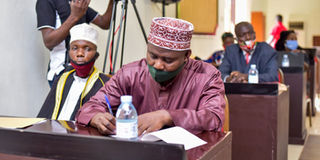Religious leaders call for capacity building in health issues

Some of the religious leaders pictured during the dialogue
Religious leaders under different affiliations have called upon government and Non-Government organizations to equip them with skills to handle health crises in the country such as reproductive issues.
During an inter religious dialogue on harnessing the role of religious leaders in addressing adolescent health challenges in Jinja, Sheikh Muhammed Ali Waiswa the second deputy mufti of Uganda (Uganda Muslim Supreme Council) said although some religious institutions work hard to build capacity of clerics, it is not enough to address the current crises such as problems regarding reproductive health in terms of child marriages, teenage pregnancies, HIV that are happening in the country.
"Many religious leaders are merely trained theologically, at times they fail to know the scale of the problem and they lack data to be able to describe the necessary action that is needed to be done. Preaching is comforting who is undergoing the problem but how you eliminate the problem requires to also have capacity," Sheikh Waiswa said.
Sheikh Waiswa added that, "Counselling is a skill and scientific, I know some religious leaders have that background of scientific mind. Actually you can find those religious leaders who are counselling without necessary having been trained create more problems than solutions so thats a very big challenge.".
Mr Benedict Wakabi youth Chaplain of Jinja diocese said though religious leaders have the platform, they lack expertise and therefore the need for partnerships between health workers to work with the church to reach out to the young people.
Following the closure of schools by President as one of Covid-19 preventive measures, a number of school girls across the country ended up pregnant and others in child marriages.
Ms Jackie Katana, the chairperson executive Board Faith for Family Health Initiative said to end such problems there is need to provide religious leaders with statistics for them to speak with evidence but also the need to harness the position of different religious groups and work together.
"Religious leaders do not need to be public health, by nature of their work and calling, they do this on a daily basis. They have a plat form and they are good communicators, with their back up and support, a step can be taken to harnessing the challenges," Ms Katana said.
However some religious leaders have condemned parents for not playing their role which has resulted into escalated teenage pregnancies during lockdown period.
Mr Wakabi said religious leaders ought to teach about issues that affect young people such as school drop outs, teenage pregnancy during their teachings.
Mr Charles Owekmeno, a national coordinator of Sexual Reproductive Health and Rights Alliance, said religious leaders have a big platform and responsibility to address issues of adolescent health.
Mr Owekmeno said they are planning full program of capacity building and mentorship with religious leaders regarding issues of reproductive health





